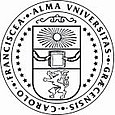The electronic signature
The electronic signature offers the possibility of signing documents in a legally valid manner. This procedure is regulated in Austria by the Signature Act.
At the University of Graz, documents issued by the Rectorate in connection with study law, as well as notifications of recognition at the Faculty of Humanities, are signed digitally with a qualified signature (cell phone signature).
The cell phone signature is equivalent to a handwritten signature and offers protection against document and content forgery. It functions as an electronic ID card that can be used to sign official or private-sector documents quickly and easily in a legally binding manner. Possible manipulations or transmission errors are thus immediately recognizable. The qualified certificate used from A-Trust guarantees maximum security standards that comply with all EU directives, regulations and laws.
These digitally signed documents can be checked at any time for data integrity ("Has the document been changed after signing?") and for authenticity ("Who signed?").
Official signature within the meaning of the Signature Act as amended
The official signature is the legally valid electronic signature applied to electronic documents. It can be verified in the electronic document by authorized verification agencies and is visually represented in the printout by the image mark (comparable to a "round stamp"), information on the verification of the signature, and an indication that the document has been officially signed. This makes it clear to the recipient that the document is an official document of the designated public institution.
Officially signed documents are created according to the following pattern:
The alphanumeric string in the footer is a randomly generated code and is used to identify the page affiliation.
The official signature can be verified at https://pruefung.signatur.rtr.at/.

